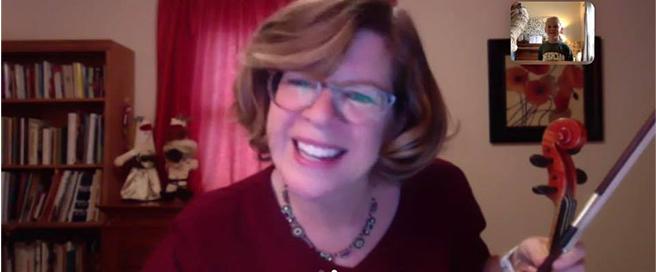Practice During a Pandemic

June 9th, 2020
Enjoy these words of inspiration from Ann Montzka-Smelser, MIC Suzuki violin faculty member, regarding how to support your child while practicing during a pandemic.
I believe the most motivating force in a practice relationship is respecting your child’s feelings over the skills being practiced.
The Suzuki method is based upon the faith of building a nurturing environment. “If we build it, they will practice,” or something like that! The hard truth is we cannot control our child’s motivation any more than we can deny our own feelings of frustration. The definition for the word motivation reads: “The reason or reasons one has for acting or behaving in a particular way.” During this pandemic we have reason to act defiant, depressed, thankful, anxious, stir-crazy, calm, lonely, deprived, sad, reflective, frustrated or sometimes all these emotions in one day. Our children need us; even if it is to feel all these things together, or to not know what you are feeling. Our children look for their own reflection in our eyes. They want to be seen and loved and reassured that things will be okay.
Here are some actions for creating a motivating practice environment for you and your child. Spoiler alert - It has much more to do with your attitude and tenacity than theirs.
- Make sure you have activities away from practice time that is just for being together.
- When it is time to practice - keep music supplies accessible and in view. (violin on a wall hook, music stand with notes, books and metronome, etc.) Getting started with practice is the hardest part!
- Create a change of scenery by going outside for a practice session - pianists can do music theory games or listening.
- Make movement part of practice time! Our brains need oxygen and hydration and with all this screen time we need to dance, stretch and move!
- For the child who likes to be in charge, let her create the practice order and decide what is on the “tomorrow” list.
- Create a Zoom practice play date with a friend(s) or a concert for a relative. Sometimes just sharing music - with no agenda or correction - is the most beneficial.
- Balance activities between easy/hard/medium and take a moment to plan creativity in practices through games, treasure hunts, stories or creative repetition.
- Listen and learn a piece that speaks to your child, from Baby Shark to Lindsey Sterling, jazz, fiddle, or pop. Or research and write to a famous musician!
- For older students, create a practice buddy - where a more advanced student could help a less advanced student over Zoom… we learn by teaching - or teach someone in the house that has never played.
- Regular private and group lessons give structure to practice. Plan S.M.A.R.T. goals with your teacher (see last month’s Suzuki Sentinel).
- Lastly, quit while you are ahead! It is much easier to start again the next day when a practice ends on a happy note!
To learn more about Ann, please click here. To learn more about the Suzuki Program at MIC, please click here.
